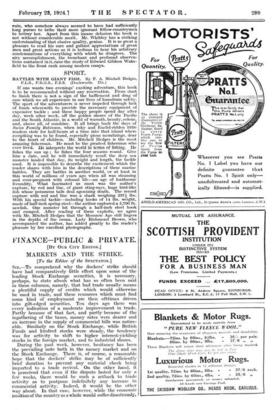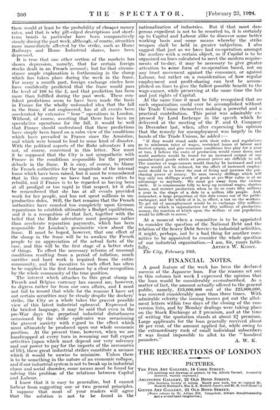FINANCE-PUBLIC & PRIVATE.
PIT OUR CITY EDITOR.]
MARKETS AND THE STRIKE.
[To the Editor of the SPECTATOR.] SIR,—To comprehend why the dockers' strike should have had comparatively little effect upon some of the leading Stock Exchange securities, it is necessary, perhaps, to state afresh what has so often been said in these columns, namely, that bad trade usually means a plentiful supply of credits which would otherwise be used in trade, and these resources which must find some kind of employment are then ofttimes driven into gilt-edged securities. Ten days ago there was every indication of a moderate improvement in trade. Partly because of that fact, and partly because of the ingathering of the taxes, money rates were dearer and an increase in the supply of commercial bills was. notice- able. Similarly on the Stock Exchange, while British Funds and kindred stocks were steady, the tendency was for activity to shift to higher interest-yielding stocks in the foreign market, and to industrial shares.
During the past week, however, hesitancy has been the prevailing note both in the money market and on the Stock Exchange. There is, of course, a reasonable hope that the dockers' strike may be of sufficiently brief duration to prevent any material check being imparted to a trade revival. On the other hand, it is perceived that even if the dispute lasted for only a few weeks, there would be such a setback to trade activity as to postpone indefinitely any increase in commercial activity. Indeed, it would be the other way about. In that case, however, while the economic Position of the country as a whole would suffer disastrously, there would at least be the probability of cheaper money rates, and that is why gilt-edged descriptions and short- term bonds in particular have been comparatively steady during the past week, although, of course; securities more immediately affected by the strike, such as Home Railways and Home Industrial shares, have been depressed. 4t is true that one other section of the markets has shown depression, namely, that for certain foreign stocks dealt in on French account; but for that circum- stance ample explanation is forthcoming in the slump which has taken place during the week in the franc. For many a month past, foreign exchange circles here have confidently predicted that the franc would pass the level of 100 to the £, and that prediction has been more than fulfilled during the past week. These con- fident predictions seem to have been made the basis in France for the wholly unfounded idea that the fall in the franc, if not engineered, has at all events been accelerated by extensive " bear " operations in London. Without, of course, asserting that there have been no speculative operations for the fall, it would be well that France should understand that these predictions have simply been based on a calm view of the conditions which have prevailed in France since the Armistice, and which were bound to lead to some kind of disaster. With the political aspects of the Ruhr adventure I am not, of course, concerned in this letter. Nor must it be supposed that the City is not sympathetic with France in the conditions responsible for the present debacle in the franc. It is easy, of course, to blame the French authorities for the magnitude of the internal loans which have been raised, but it must be remembered +hat in this • country we have had no waste cities to rebuild, and if France is to be regarded as having been at all prodigal or too rapid in that respect, let it also 'be remembered that she has at all events provided work for her people, and has not spent millions in un- productive doles. Still, the fact remains that the French authorities have counted too completely upon German reparations to establish ultimately a Budget equilibrium, and it is a recognition of that fact, together with the belief that the Ruhr adventure must postpone rather than accelerate reparation payments, which has been responsible for London's pessimistic view about the franc. It must be hoped, however, that one effect of the slump in the franc will be to awaken the French people to an appreciation of the actual facts of the case, and this will be the first stage of a better state of things. To effect the necessary reforms of unsound conditions resulting from a period of inflation, much sacrifice and hard work is required from the entire community, and the incentive to such effort has often to be supplied in the first instance by a clear recognition by the whole community of the true position. The interest which attaches to this great slump in French and Belgian currency has caused me, however, to digress rather far from our own affairs, and I must not fail to record that while for the reasons I have set out certain securities may be steady despite the dockers' strike, the City as a whole takes the gravest possible view of this latest industrial upheaval. Expressed in the briefest language, it may be said that even in the pre-War days the perpetual industrial disturbances occasioned by the strike epidemics was occasioning the gravest anxiety with regard to the effect which must ultimately be produced upon our whole economic position. At the present time, however, when we are handicapped at every turn in resuming our full export activities (upon which must depend our very solvency and our power to pay for the imports of the necessaries of life), these great industrial strikes constitute a menace which it would be unwise to minimize. Unless there is to be something in the nature of an economic collapse, and if our industrial system is not to break up in industrial chaos and social disorder, some means must be found for solving this problem of the relations between Capital and .Labour. - I know that it is easy to generalize, but I cannot forbear from suggesting one or two general principles. I suppose that most of your readers will agree that the solution is not to be found in the nationalization of industries. But if that most dan- gerous expedient is not to be resorted to, it is certainly up to Capital and Labour alike to discover some better working basis and -some means• whereby the strike weapon shall • be held in greater 'subjection. I also suggest that just as we have had co-operation amongst the workers with a certain object, so if Capital is to be organized on lines calculated to meet the modern require- ments of to-day, it may be necessary to give greater attention to some form of co-operation based, not on any trust movement against the consumer, or against Labour, but rather oh a consideration of how regular employment and profit-sharing can best be accom- plished on lines to give the fullest possible benefit to the wage-earner, while preserving at the same time the fair and just rights of Capital. At the same time it must be fully recognized that no such organization could ever be accomplished without the Trade Unions themselves making a powerful and a practical contribution. This point was admirably ex- pressed by Lord Inchcape in the speech which he delivered at the meeting of the P. and 0. Company in December last, when, after expressing his opinion that the remedy for unemployment was largely in the hands of the Trade Unions, he added :- " if they would stand aside with their rules and regulations as to minimum rates of wages, restricted hours of labour and limited output, and give economic conditions free play for a year or two, I believe the costs of production would come down and world markets would be found for an increased output of our manufactured goods which at present prices are difficult to sell. The number of wage-earners would thereby be increased and real wages would not be reduced, for the effect of increased employ- ment should be to lower the cost of living and increase the pur- chasing power of money. To earn twenty- shillings which will buy only ten shillings worth of goods at pre-War value is of no advantage to anybody. We must get away from the vicious circle. It is consummate folly to keep up nominal wages, shorten hours, and restrict production when to do so costs fifty millions a year in the shape of a dole to a million idle people. And, remember, a large proportion of this dole comes out of the public exchequer, and the whole of it is, in effect, a tax on the workers. To get rid of unemployment would be to exchange fifty million; of money which is unproductive for fifty millions of productivo money, the reaction of which upon the welfare of our population would be difficult to assess."
At a moment when a committee is to be appointed to consider the question of the National Debt and the relation of the heavy Debt Service to industrial activities, it might, perhaps, not be a bad thing for another com- mittee to be appointed to consider the whole question of our industrial organization.—I am, Sir, yours faith-











































 Previous page
Previous page